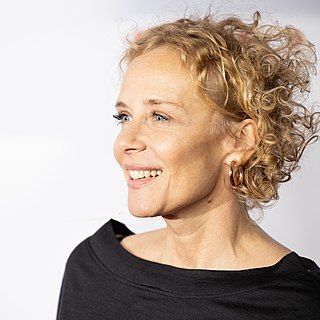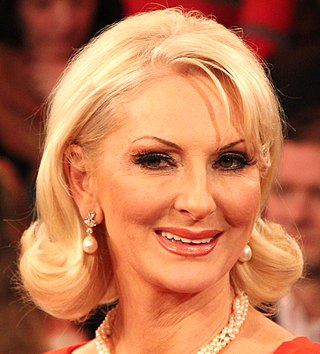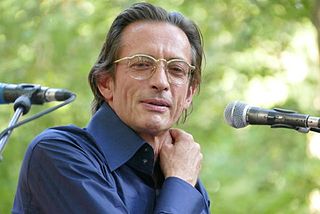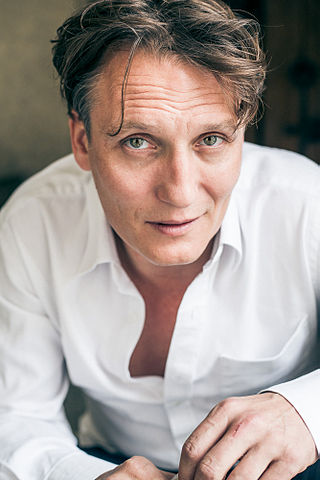The International Federation of Film Critics is an association of national organizations of professional film critics and film journalists from around the world for "the promotion and development of film culture and for the safeguarding of professional interests." It was founded in June 1930 in Brussels, Belgium. It has members in more than 50 countries worldwide.

The Marriage of Maria Braun is a 1979 West German drama film directed by Rainer Werner Fassbinder. The film stars Hanna Schygulla as Maria, whose marriage to the soldier Hermann remains unfulfilled due to World War II and his post-war imprisonment. Maria adapts to the realities of post-war Germany and becomes the wealthy mistress of an industrialist, all that while staying true to her love for Hermann.

Ali: Fear Eats the Soul is a 1974 West German drama film written and directed by Rainer Werner Fassbinder, starring Brigitte Mira and El Hedi ben Salem. The film won the International Federation of Film Critics award for best in-competition movie and the Prize of the Ecumenical Jury at the 1974 Cannes Film Festival. It is considered to be one of Fassbinder's most powerful works and is hailed by many as a masterpiece.

Barbara Sukowa is a German actress of screen and stage and singer. She has received three German Film Awards for Best Actress, three Bavarian Film Awards, Cannes Film Festival Award for Best Actress, Venice Film Festival Award, as well as nominations for European Film Awards, César Awards and Grammy Awards.

Michael Ballhaus, A.S.C. was a German cinematographer. He is known for his work with directors including Rainer Werner Fassbinder, Martin Scorsese, Mike Nichols, James L. Brooks, and Wolfgang Petersen. He was a member of both the Academy of Arts, Berlin, and the American Society of Cinematographers.

Katja Hannchen Leni Riemann is a German actress.

Werner Schroeter was a German film director, screenwriter, and opera director known for his stylistic excess. Schroeter was cited by Rainer Werner Fassbinder as an influence both on his own work and on German cinema at large.

Eva Mattes is a German-Austrian actress. She has appeared in four films directed by director Rainer Werner Fassbinder. In A Man Like E.V.A. (1984), she played a bearded film director, based on the recently deceased Fassbinder.
Room 666 is a 1982 documentary film directed by German film director Wim Wenders.

Désirée Gerda Saskia Pamela Amneris Aida Nick is a German reality television personality, actress, dancer, and author.

No Place to Go is a German black-and-white film released in April 2000, directed by Oskar Roehler, starring Hannelore Elsner, about a suicidal middle-aged writer travelling around Germany at a time of personal crisis.

Margit Carstensen was a German theatre and film actress, best known outside Germany for roles in the works of film director Rainer Werner Fassbinder. She appeared in films of directors Christoph Schlingensief and Leander Haußmann and on television in Tatort.

Oskar Roehler is a German film director, screenwriter and journalist. He was born in Starnberg, the son of writers Gisela Elsner and Klaus Roehler. Since the mid-1980s, he has been working as a screenwriter, for, among others, Niklaus Schilling, Christoph Schlingensief and Mark Schlichter. Since the early 1990s, he has also been working as a film director. For his film No Place to Go he won the Deutscher Filmpreis. His 2010 film Jew Suss: Rise and Fall was nominated for the Golden Bear at the 60th Berlin International Film Festival.

The 27th Cannes Film Festival was held from 9 to 24 May 1974. The Grand Prix du Festival International du Film went to The Conversation by Francis Ford Coppola.
Shadow of Angels is a 1976 Swiss drama film directed by Daniel Schmid. It was entered into the 1976 Cannes Film Festival. The film is based upon the play Der Müll, die Stadt und der Tod by Rainer Werner Fassbinder.
Michael Fengler is a German film producer, director and screenwriter. In 1970, along with Rainer Werner Fassbinder, he co-directed the film Why Does Herr R. Run Amok?. It was entered into the 20th Berlin International Film Festival.

Oliver Masucci is a German actor. He is best known internationally for the role of Adolf Hitler in the 2015 film adaptation of the satirical novel Look Who's Back, Ulrich Nielsen in the Netflix series Dark, and Anton Vogel in Fantastic Beasts: The Secrets of Dumbledore.
Baal is a 1970 German television film directed by Volker Schlöndorff. It is based on the 1923 play Baal by Bertolt Brecht. The film disappeared after Helene Weigel, Brecht's widow, saw it on television and demanded that it no longer be shown. Ethan Hawke asked Schlöndorff about seeing the film at the Cannes Film Festival, but Schlöndorff replied that he did not know where it was. Eventually the film was discovered in rusty, unmarked cans filed under S. At that point, the film was restored. It was given its first home video release by Criterion in 2018. The film did not make the 1919 play a period piece, and some of the interiors featured intentionally over-the-top colors. It was the first film Dietrich Lohmann shot in color. Margarethe von Trotta was the first actor cast. Fassbinder joined for the title role after Schlöndorff's first choice was unavailable. Much of the supporting cast and crew came from Fassbinder's company, whom he did not want to be put out of work by his absence.
Veronika Franz and Severin Fiala are an Austrian filmmaking duo. Franz is a long time partner and Fiala the nephew of filmmaker Ulrich Seidl. Franz, a former film journalist, began her film career co-writing with Seidl. Franz and Fiala began their creative partnership writing and directing Kern (2012), a documentary about the actor Peter Kern. They went on to gain international notice for their feature debut, the German-language psychological horror film Goodnight Mommy (2014), which was selected as the Austrian entry for the Best Foreign Language Film at the 88th Academy Awards.
Rainer Werner Fassbinder was a German filmmaker.












